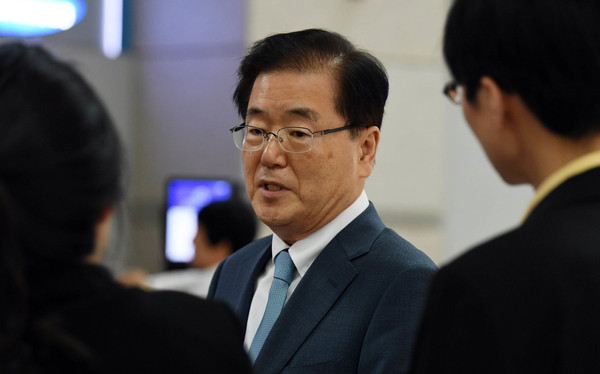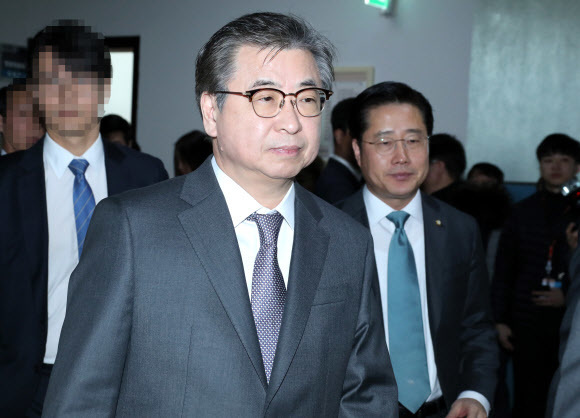 |
|
Blue House National Security Office director Chung Eui-yong
|
NIS Director Suh Hoon is regarded is the likely person to head South Korean delegation
While Kim Jong-un has not had any foreign contact since becoming supreme leader of North Korea in 2011, South Korean government officials are on the verge of meeting him personally for the first time to discuss denuclearization and improving inter-Korean relations. South Korean President Moon Jae-in has reportedly considered the question of who should be the special envoy to carry out this mission from a variety of angles. The special envoy to North Korea must be an official who is high enough in rank to serve as a proxy for Moon, one of Moon’s trusted allies who is able to communicate frankly with him, and a figure with an accurate understanding of affairs on the Korean Peninsula. It is for these reasons that National Intelligence Service Director Suh Hoon is regarded as the likely person to lead South Korea’s special delegation to the North. Suh’s experience arranging the first inter-Korean summit in 2000 and the second summit in 2007 makes him the preeminent strategist on North Korean affairs in the Moon administration. In addition, he is a close associate of Moon who helped him draw the outline for his plan for peace on the Korean peninsula. Suh was present when Kim Yo-jong, the first vice director of the central committee of the North Korean Workers' Party who visited South Korea on Feb. 9 as a special envoy for Kim Jong-un, met Moon at the Blue House, and Suh also reportedly led the deliberations with North Korean Workers' Party Central Committee vice chairman Kim Yong-chol, who arrived in South Korea on Feb. 25 and stayed for three days. But though Suh is one of Moon’s closest allies and advisors, there is stiff opposition to his selection from the opposition party, which considers it inappropriate to send the director of the National Intelligence Service (NIS), which is responsible for “catching spies,” as a special envoy to North Korea. Since Moon is trying to minimize the political cost of sending a special delegation, it is unclear what decision he will make. The other leading contender for special envoy is Blue House National Security Office director Chung Eui-yong. Though Chung is not an expert on inter-Korean relations, he is the senior official responsible for coordinating all urgent matters on the Korean Peninsula in his role as Moon’s “control tower” for foreign policy and security. When there was talk about a rupture in the South Korea-US alliance over the deployment of the THAAD missile defense system with US troops in South Korea early in Moon’s presidency, Chung paid a visit to the US, where he was credited for working with the White House and deftly handling the situation. Considering that the key matters that the special envoy must deal with are North Korea’s denuclearization and North Korea-US relations, and in light of conservative views in South Korea and the US, one view that reportedly has gained currency at the Blue House is that sending Chung would create less political blowback since he has earned the basic trust of the Trump administration. Chung was also one of the four people who were present during Moon’s meeting with Kim Yo-jong. Furthermore, aside from Moon, he is the only figure that the Blue House said communicated South Korea’s message to Kim Yong-chol during his visit to the South. Another option that is reportedly being considered is having Chung and Suh both join the delegation while playing different roles. The special delegation is likely to include a number of lower-level staff from government agencies such as the Blue House National Security Office and the Unification Ministry, including NIS Deputy Director Kim Sang-gyun, who coordinated the visit to South Korea by Kim Yong-chol and the rest of North Korea’s second high-ranking delegation.
 |
|
National Intelligence Service Director Suh Hoon
|







